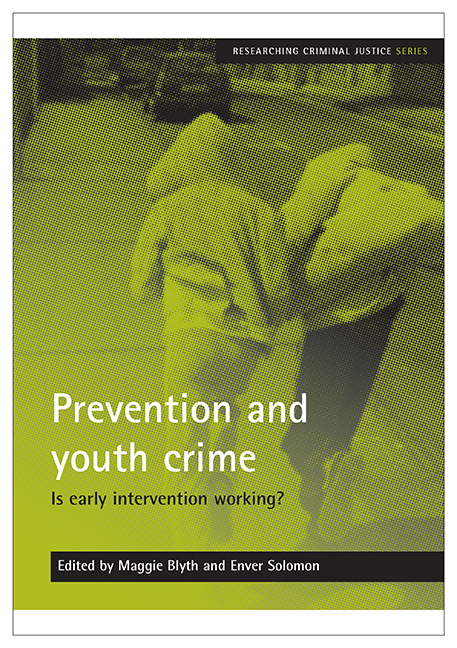Book contents
- Frontmatter
- Contents
- Foreword
- Acknowledgements
- List of abbreviations
- Notes on contributors
- Introduction
- 1 Integrated or targeted youth support services: an essay on ‘prevention’
- 2 Intervening in gang-affected neighbourhoods
- 3 Family intervention projects and the efficacy of parenting interventions
- 4 Early intervention and prevention: lessons from the Sure Start programme
- 5 Attachment research and the origins of violence: a story of damaged brains and damaged minds
- 6 Early intervention in the youth justice sphere: a knowledge-based critique
- 7 European perspectives on prevention
- Conclusion
7 - European perspectives on prevention
Published online by Cambridge University Press: 25 March 2023
- Frontmatter
- Contents
- Foreword
- Acknowledgements
- List of abbreviations
- Notes on contributors
- Introduction
- 1 Integrated or targeted youth support services: an essay on ‘prevention’
- 2 Intervening in gang-affected neighbourhoods
- 3 Family intervention projects and the efficacy of parenting interventions
- 4 Early intervention and prevention: lessons from the Sure Start programme
- 5 Attachment research and the origins of violence: a story of damaged brains and damaged minds
- 6 Early intervention in the youth justice sphere: a knowledge-based critique
- 7 European perspectives on prevention
- Conclusion
Summary
International norms
International norms have increasingly emphasised the importance of seeking to prevent young people's involvement in delinquency rather than simply addressing such behaviour after it happens. The United Nations (UN) Committee on the Rights of the Child has stated that ‘a juvenile justice policy without a set of measures aimed at preventing juvenile delinquency suffers serious shortcomings’ (UNCRC, 2007, p 7). The UN Guidelines for the prevention of juvenile delinquency (the Riyadh Guidelines) stress that ‘prevention requires efforts on the part of the entire society to ensure the harmonious development of adolescents … from early childhood’ (UN, 1990, principle 2) and calls for close interdisciplinary cooperation. The role of the wider family, school, neighbourhood and peer group is also emphasised in the Council of Europe's recommendation 2003: 20 concerning ‘new ways of dealing with juvenile delinquency and the role of juvenile justice’ (Council of Europe, 2003).
The case for prevention is at one level self-evident, and there is still widespread support in Europe for Franz von Liszt's (1905) dictum that the best crime policy is social policy. Comparing data from the United Nations Children's Fund (UNICEF) against the prison population shows that countries that rank highly on child well-being tend to have lower rates of imprisonment than those who fare badly. Of the 10 countries in the study with the highest overall ranking for child well-being, seven have prison populations of less than 80 per 100,000, including Norway and all the Nordic countries. Of the bottom 10, six, including the UK1, have prison populations of over 100 per 100,000 (Allen, 2008) (see Figure 7.1).
International standards also contain some warnings about the potentially harmful consequences of early intervention. For example, the Riyadh Guidelines state that ‘labelling a young person as deviant, delinquent or pre-delinquent often contributes to the development of a consistent pattern of undesirable behaviour’ (UN, 1990, para 5f), and therefore suggest that ‘[f]ormal agencies of social control should only be utilized as a means of last resort’.
This is perhaps one reason why the Council of Europe's Human Rights Commissioner has expressed concern about Anti-Social Behaviour Orders (ASBOs), suggesting that their excessive use ‘is more likely to exacerbate anti-social behaviour and crime amongst youths than effectively prevent it’ (OHCHR, 2005, p 36).
- Type
- Chapter
- Information
- Prevention and Youth CrimeIs Early Intervention Working?, pp. 105 - 114Publisher: Bristol University PressPrint publication year: 2008



